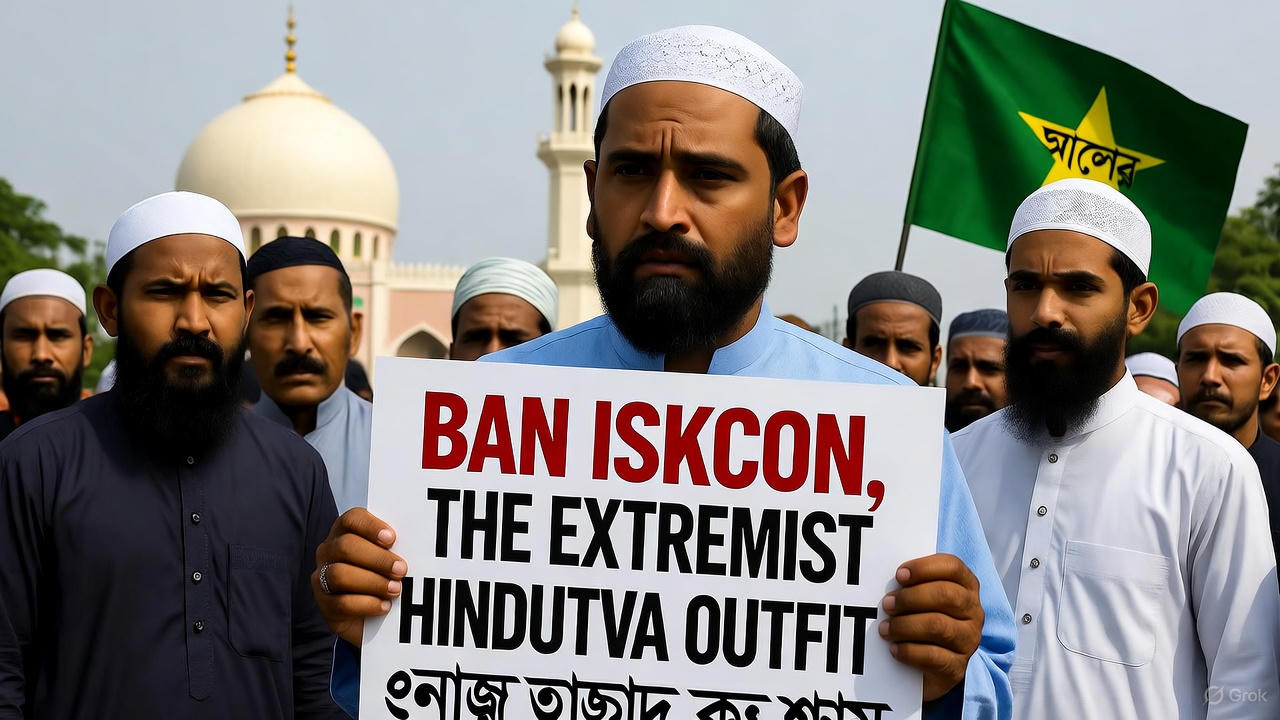
Protests Erupt in Dhaka and Chattogram Demanding ISKCON Ban (Grok)
Dhaka: After Friday prayers, a large number of Islamic organizations took to the streets in Bangladesh's capital, Dhaka, and second-largest city, Chattogram. These included radical organizations like Hifazat-e-Islam and Intifada Bangladesh. These groups demanded a ban on ISKCON (International Society for Krishna Consciousness), calling it a “radical Hindutva organization.”
The protest comes as Bangladesh's interim government, led by Muhammad Yunus, described ISKCON as a "religious fundamentalist organization" in response to a petition filed in the High Court. This matter is related to the petition that demands a ban on ISKCON. In this background the atmosphere has become more tense following the recent attacks on Hindu temples and ISKCON centers and the arrest of ISKCON activist Krishna Das Prabhu.
Intifada Bangladesh put forward six demands outside Dhaka's Baitul Mukarram National Mosque, the most important of which were an immediate ban on ISKCON and an investigation and legal action against the organization.
Jasimuddin Rahmani, head of the fundamentalist organization Ansarullah Bangla Team (ABT), who was recently released from jail by the Yunus government, said, "ISKCON is not a Hindu organization but an extremist organization created by Jews. The need of the hour is to ban it."
In Chattogram too, Hefazat-e-Islam held a rally outside Andarkilla Shahi Jame Masjid after Friday prayers and demanded a ban on ISKCON. Speakers said that just as Awami League was banned for indulging in crimes, similarly “radical organization ISKCON” should also be brought under the ambit of the law.
Muhaddis Ashraf Ali Nizampuri of Hathazari Madrasa alleged that "ISKCON, being an agent of India, is hatching conspiracies against Muslims in Bangladesh. It has created many establishments in the name of temples across the country and has weakened the Islamic community."
Attacks and violence on ISKCON have increased since the fall of the Sheikh Hasina government. Many temples were demolished, and incidents of atrocities on the Hindu community increased. Meanwhile, the Bangladesh Financial Intelligence Unit (BFIU) in January seized the bank accounts of 17 people linked to ISKCON, alleging they were involved in money laundering.
However, the reality is that ISKCON has been active in humanitarian service and relief work in Bangladesh since the 1970s. Its “Food for Life” program fed millions of people during the 1971 war and floods. ISKCON also runs schools, orphanages, and free medical camps.
According to analysts, the attacks on ISKCON and the demand for a ban show that fundamentalist forces are becoming increasingly strong in Bangladesh. These groups have now started influencing the government policies also. The Yunus government may be calling these allegations a fabricated story of the media, but the increasing violence against minorities is raising serious questions about the future of the country.





Copyright © 2026 Top Indian News
